After the Party: A Walking Tour of Manchester with Andy Spinoza
By Chandler DandridgeOctober 10, 2023
:quality(75)/https%3A%2F%2Fdev.lareviewofbooks.org%2Fwp-content%2Fuploads%2F2023%2F10%2FManchester-Unspun.jpg)
Manchester Unspun: Pop, Property, and Power in the Original Modern City by Andy Spinoza
The Pistols played at the Free Trade Hall, a monumental palazzo-style building constructed on the site of the infamous Peterloo Massacre, where 60,000 working-class people had gathered in 1819 to express their discontent. The workers, many from Manchester’s vital textile trade, had seen their wages slashed drastically by factory owners. The mass gathering turned into the bloodiest political event on British soil in the 19th century, with at least 15 people dying as a saber-wielding private militia stormed through the crowd on horseback.
With similar economic discontent in 1976, surely such a population was primed to descend upon the Free Trade Hall for the aggressive, anti-establishment message of the Sex Pistols. Yet as local legend tells it, only 40 people turned up—though within that faithful 40 were figures who would shape the music and culture of Manchester for the next four decades. Whether they were all actually there (for there was a second show a few weeks later that drew hundreds) is up for debate. But the fact is, the Pistols kicked something off in Manchester that day.
Journalist Andy Spinoza arrived in the city three years later to attend the University of Manchester. That same year, the band Joy Division (three members of which were at the Free Trade Hall concert) released their debut studio album on Factory Records, a label started by regional television star Tony Wilson (another FTH attendee). Andy went on to found the alternative paper City Life with a couple of friends in 1983. The paper became central to the emerging scene around Wilson and Factory Records, as well as the Joy Division follow-up New Order, formed after the former’s lead singer Ian Curtis killed himself in 1980. Andy and City Life covered the scene with a youthful fervor, as many of its subjects went from hometown heroes to international superstars.
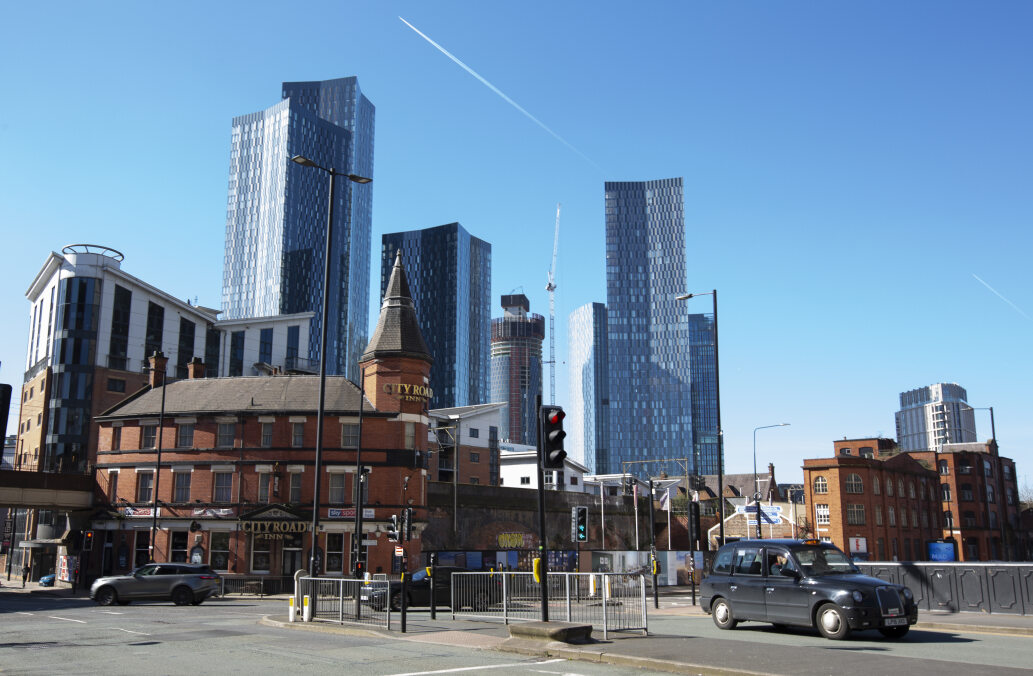
Manchester Unspun: Pop, Property, and Power in the Original Modern City (2023) is the result of Andy’s 40 years on the ground in Manchester, a city that has transformed from postindustrial ruin to an injection site for international capital from every corner of the earth. The book’s argument, and it is a convincing one, is that the scene sprung from the Free Trade Hall in 1976 created the conditions for Manchester’s current development boom. No longer is its skyline dominated by smoke from the chimneys of “[t]hirty or forty factories […] on the tops of the hills,” as Alexis de Tocqueville described it in 1835, but rather by 30 or 40 cranes perpetuating the expansion of high-rise, high-rent skyscrapers in the city center—or town, as the Mancunians say.
I meet Andy on the edge of town, at the campus of the University of Manchester, where we begin our walking tour. The streets teem with students, sometimes a dirty word in working-class Mancunia. Andy, a tall, angular man, shoots right into it, speaking about the “gravitational pull” he felt toward the university as a teen. But this pull was not due to its excellence in academic research. For Andy, along with countless others at the time, Manchester’s allure came beaming out of the thousand-foot-tall tubular structure on Winter Hill, 15 miles northwest of the city center, that broadcast the signal of Granada Television. A northern network, Granada mainly brimmed with parochial programming save for one voice in the wilderness: that of Tony Wilson. “One way for Americans to understand Tony Wilson,” says Andy, “is as a kind of countercultural Walter Cronkite.”
For instance, when reporting the news of the day, Wilson would make a point to use the term soldiers instead of terrorists when talking about IRA fighters in Northern Ireland. Wilson was born and raised in Greater Manchester and never left. Andy calls him a “Mancunian chauvinist,” committed to seeing his great city rise again from the ashes of deindustrialization. After seeing the Sex Pistols, Wilson put the band on his late-night show, their first appearance on the tube. He then began to dip his toes into live music promotion and started Factory Records.
Andy and I trek up Oxford Road. Every odd block, a tower of glass materializes above us, but mostly we pass through long stretches of gorgeous Victorian buildings, their red brick quarried from local sandstone 150 years ago. We arrive in front of the emblem of his book, what he describes as “a hulking structure […] built to stock large quantities of steel on the Rochdale Canal.” But in 1982, with the profits generated from Joy Division after Ian Curtis’s death, Factory Records took over the building and opened “The Haçienda,” ostensibly a nightclub yet also what Wilson dubbed “a cathedral to popular culture.”
“[W]ith this book,” Andy tells me, he was trying “to rescue the Haçienda from the cartoonish stereotypes that people may have in their heads. […] Its creation was a statement of civic pride.” “On the Haçienda membership form,” he points out, “it said ‘Intention: to restore a sense of place.’ So, this was an exercise in civic rebuilding. It was the only nightclub and music venue I know of that was ever founded on an idea: of making a city great again.”
Mancunian bands like the Smiths, Happy Mondays, the Stone Roses, and Oasis all played the Haçienda. But it was not just a local institution; it became an international destination, even hosting Madonna during her first UK tour. The nightclub served as an important site in the development of electronic music and the dance and rave scene in Britain.
But by 1992, it had become “a carnival of crime.” The introduction of ecstasy led to, says Andy,
gang […] violence, gunshots, stabbings. In any other city in the world, the officialdom would have shut it down. And the police did want to […] but the city council and the MP wrote to the police and the magistrates saying, “We need this place open, it’s important to the emerging economy of culture and tourism.”
In 1997, the nightclub ultimately did lose its license. The building stood empty for a few years before a London-based developer came in, gutted the place, and then turned it into apartments. Not ignorant of the site’s significance, the advertising of the apartments featured (as it still does) the iconic black and yellow emergency stripes associated with the Haçienda and the Factory Records branding. One promotional item for the new living spaces even read, “Now that the party’s over … you can come home.”
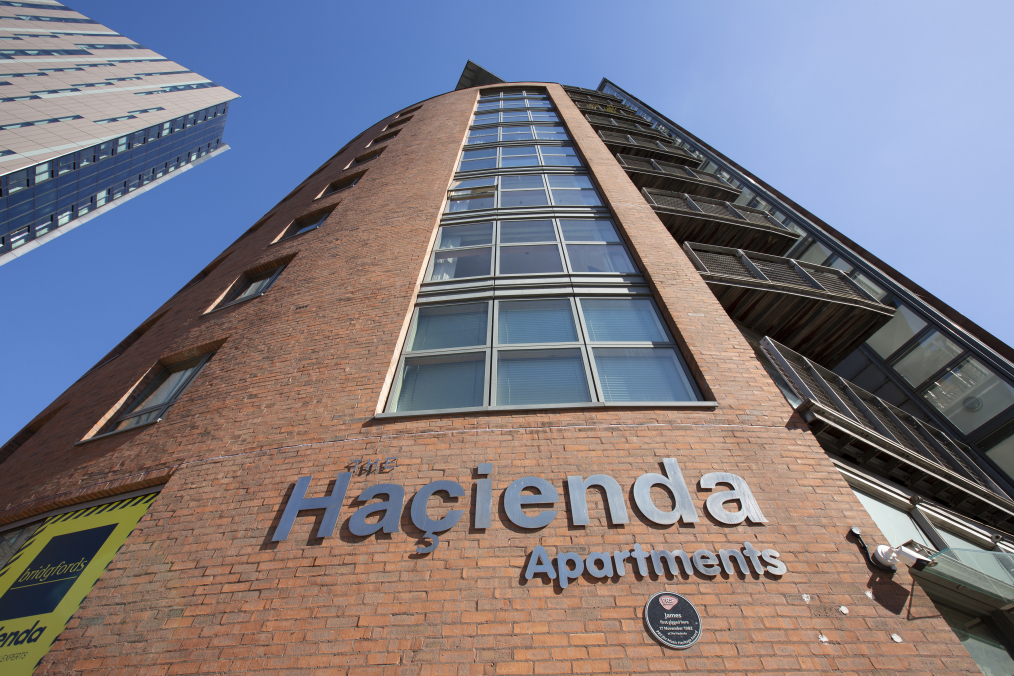
We stop at Tony Wilson Place, a town square erected in 2015 whose interests appear more commercial than public. Standing upright in the middle of the square is a huge, imposing concrete statue of Friedrich Engels, co-author of The Communist Manifesto, whose father owned a factory in Manchester. The square is what is called, contradictorily, a “privately owned public space,” meaning if you are not spending money, then no mucking about. Andy and I enter HOME, a $30 million arts center housing cinema, theater, and visual art exhibitions.
“All right, Andy.”
At the cafe sits Matt Ryan, an old friend of Andy’s and an ex-Haçienda DJ, though having hung up his headphones he now runs a yoga studio out of an old textile mill nearby. As Andy is ordering our Earl Grey, another friend stumbles in, Tim Whittle, a former “humble pot collector” (busboy) at the Haçienda who now works as a teacher. Tim orders a beer and joins our table.
The friends congratulate Andy on the book. Matt comments on its attention to detail and Andy’s encyclopedic knowledge of all things Manchester. Tim calls Andy’s book the work of a skilled journalist. What he means is that it’s presented with an impressive objectivity. Andy lays out the facts, all of them, and it is up to the reader to come to their own conclusions about what the development might mean for the future of the city and its culture.
“I’m not asking anyone to vote for me,” says Andy. “I’m not into telling people what to think. But I lived through this very interesting period, and so what I’ve written is a firsthand account of how a city has regenerated itself.”
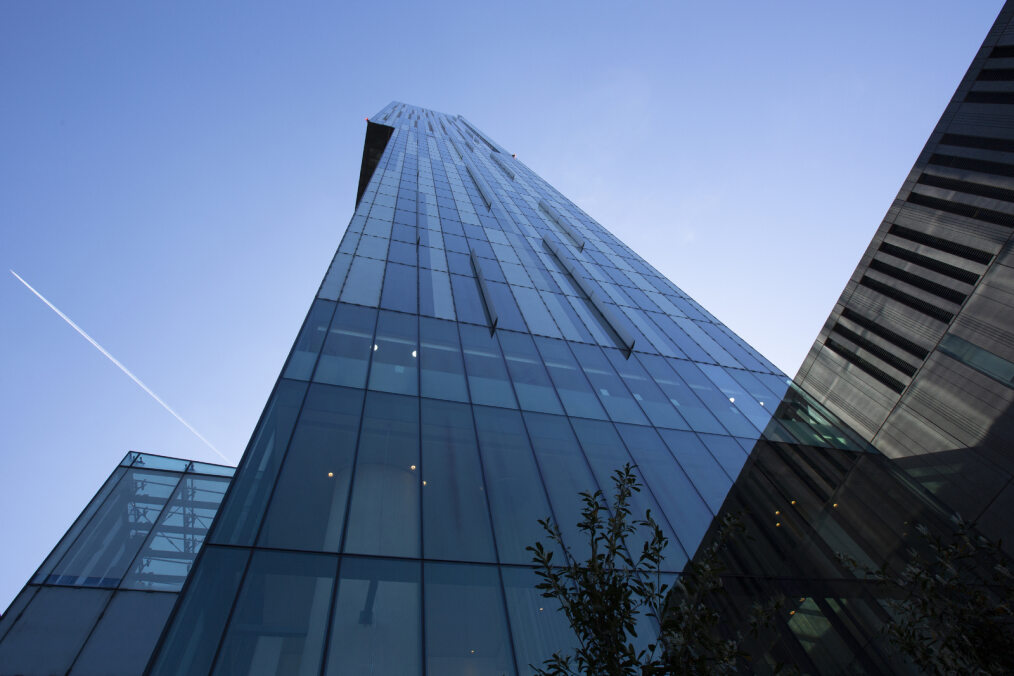
With a pair of Haçienda veterans in front of me, I can’t help but pose a question to them: Is this regeneration good? Tony Wilson Square? The Haçienda apartments?
Matt, his answer in the form of a Mancunian koan, says, “Well, it is and it isn’t, innit?”
But surely the statue of Engels standing proudly in the face of a corporate pizza chain across the square is a bit on the nose?
“Engels and Marx did their very best to demonstrate the inequalities of industrial capitalism,” says Tim. “So, it’s a bit bizarre to see Engels in this square surrounded by these corporate restaurants and businesses. But it almost kind of sums up Manchester: radical spirit and entrepreneurialism.”
And Tony Wilson, how would he view his corporatized public square?
“He was a contrarian,” says Tim. “And a provocateur. So, in a way it’s appropriate.”
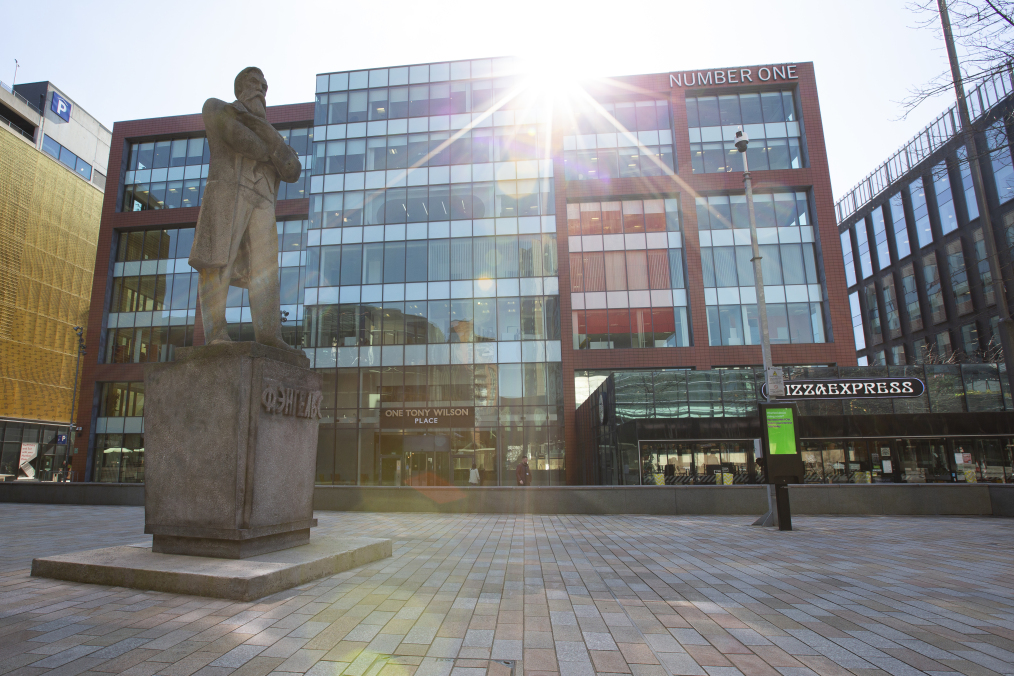
Andy and I finish our drinks and set back out. He takes me through Castlefield and along the Bridgewater Canal, citing its importance as the first place in the world where road, rail, and canal met, sparking Manchester’s 19th-century commercial prowess.
Up ahead, on the banks of the River Irwell, is the site of another uniquely Mancunian makeover. While the Haçienda’s name is sustained on the side of an apartment building, Factory Records’ will now live on in the form of a $260 million, two-auditorium and 7,000-person-capacity cultural space called Factory International. Andy sees this as the “ironic bookend” to Manchester Unspun.
“[I]t would have been impossible,” Andy says, “for anyone to forecast that such a gang of countercultural revolutionaries would have given rise to the name of a cutting-edge …” He hesitates. “I was going to call it elitist but, a cutting-edge art center called Factory International.”
We observe the men at work. Signs adorn the site reading: “We are considerate constructors.” After infinite delays, the latest of which was COVID-19, the plan was for Factory International to finally open this summer. Its program will include a variety of events from avant-garde art exhibits to a performance by American singer Janelle Monáe to a “groundbreaking mixed reality concert event” created by the late Japanese composer Ryuichi Sakamoto.
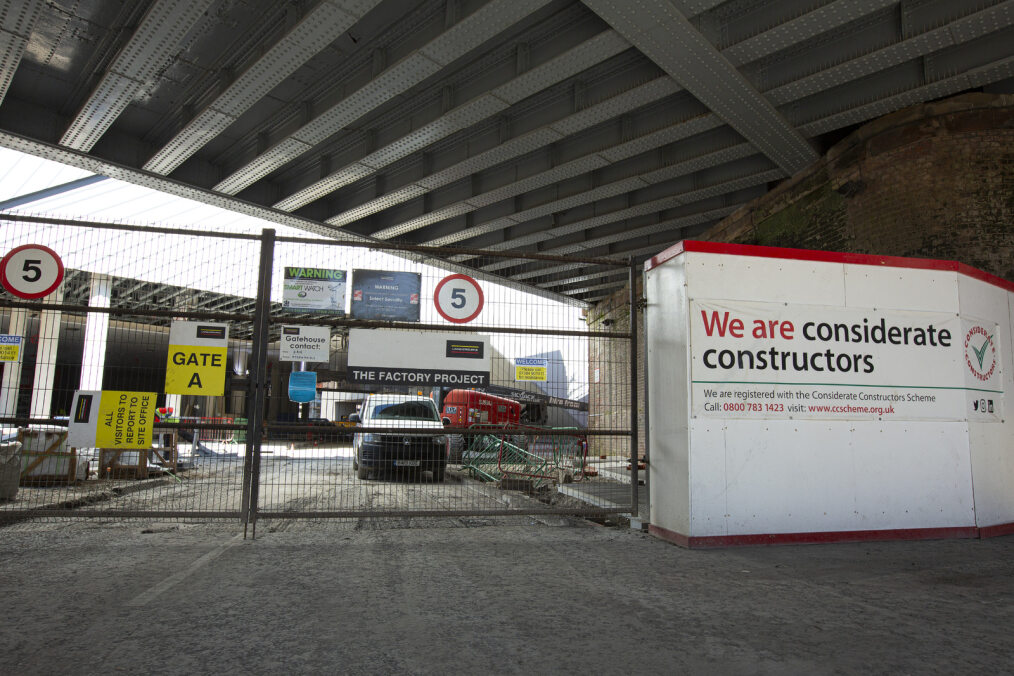
We walk up the city, tracing the serpentine shape of the Irwell. We pass a high-rise and Andy draws my attention to the corner apartment perched on the top floor. It’s Pep Guardiola’s, the mega-successful Spanish manager of Manchester City Football Club. “Sometimes at night you can see the light of his laptop through the office window.”
For years, the world knew of only one Manchester football club, David Beckham’s United, but since their takeover in 2008 by royal Abu Dhabi money, Manchester City has become a worldwide brand. I ask Andy how this foreign financial investment has changed the average Mancunian’s relationship with their football club.
“There’s a century-old community aspect to the football club,” says Andy. “It often went along with your church, your pub, your school, your workplace, and the football team. But as the huge sums of money have come in, it went from one where they felt there was a degree of closeness and belonging to one that is more marked by a commercial relationship.”
I consider the implications of this, wondering if it might not be a microcosm of the larger trend happening in Manchester, since the capital creating the skyscrapers is not homegrown.
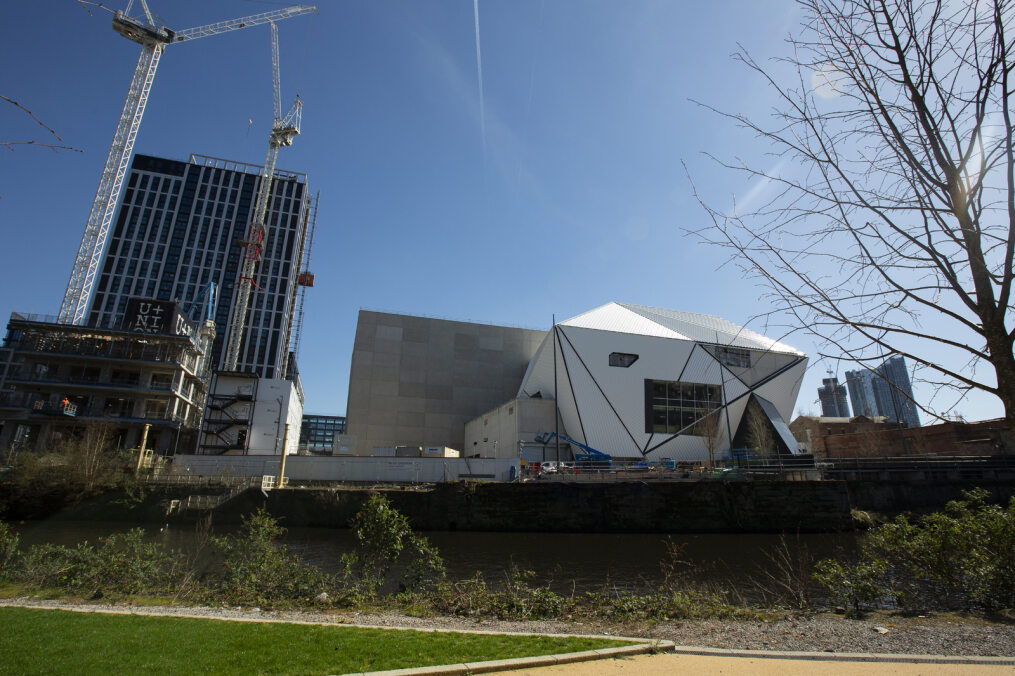
“Feeling peckish?” asks Andy.
We venture into the Northern Quarter (think Silver Lake, North Brooklyn). Fortuitous for me, though normal enough for Andy, we run into another friend, Simon Buckley, a local photographer and lifelong Mancunian who provided one of the photographs for the cover of Andy’s book. It’s a striking image: Manchester at sunrise, its skyline decorated with a dozen cranes gearing up for work.
I ask Simon what this development means for Mancunians: are all these skyscrapers actually good?
“You mean the slums in the sky?” says Simon, his bright blue eyes sparkling.
His partner, the architect and artist Agnieszka Jadowska, adds, “Their greed is stealing our sky!”
Like the expert journalist he is, Andy lets his friends speak, whether he agrees or not. I move closer to the pair to ask what they mean. Simon quotes one of Steve Coogan’s famous lines as Tony Wilson in the film 24 Hour Party People (2002): “This is Manchester … we do things differently here.”
“But I look at the city,” Simon says,
and think, Well we don’t really, do we? Is this development what the population needed? Or is it what the developers wanted? In 1989, I lived in the city center with only a couple hundred people and very little infrastructure. Now there are 70,000 people and not much more infrastructure. Very few doctors. I think there is only one more school.
The couple go on, describing the structural problems some of these skyscrapers are already having, the inhospitable living for anyone wishing to start a family in the city center, and their general skepticism over the trickle-down economics that Manchester seems to be trying. Ultimately, Andy and I take our leave in search of our evening meal. But don’t call it dinner (that’s lunch). Here in the North of England, the evening meal is, inexplicably, called tea.
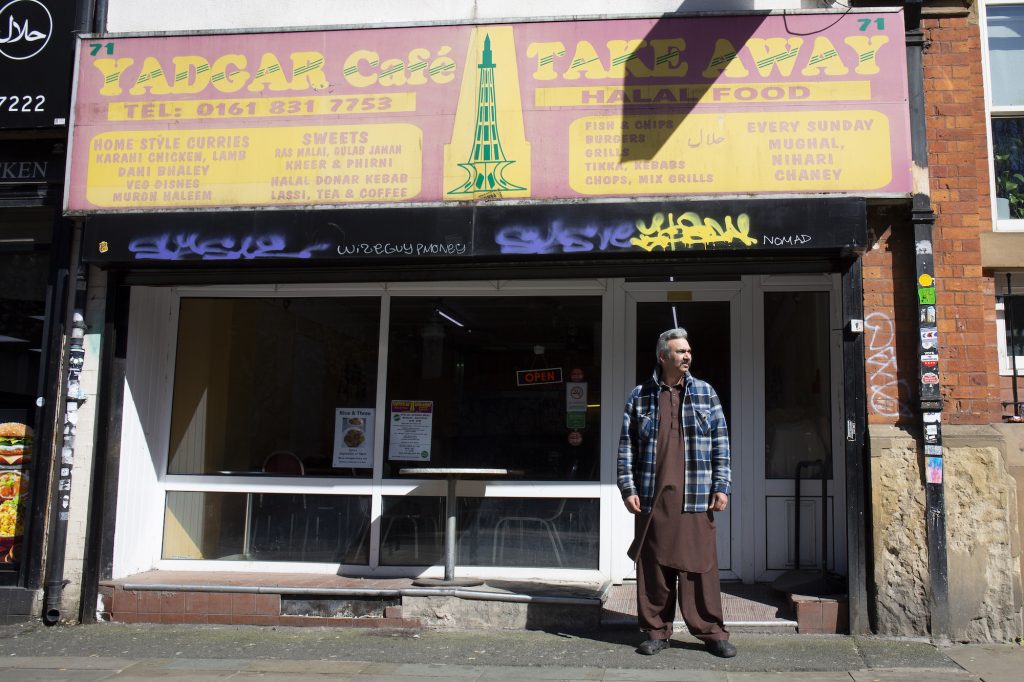
In Manchester Unspun, Andy describes the Northern Quarter before its gentrification as a “higgledy-piggledy mix of rag-trade showrooms, lively old pubs, cheap curry houses and charity drop-in offices.” We end up in one of the few remaining cheap curry houses, Yadgar Café, run by Fred, or Fareed, whose well-maintained mustache wiggles as he explains to me the secret of his long-standing café: no plastic chairs or tables.
“I have been here for 31 years,” says Fred, serving our choice of three curries over rice. “I’ve seen a lot of change around here.”
We pay him the £7.50 each and fill our steel cups from a pitcher of water. The spice is divine, and we scrape our plates clean. Andy excuses himself as he focuses on his phone, returning a load of messages and emails. In PR mode for the launch of his book, he corresponds with the organizer of an event at the Anthony Burgess Foundation the following evening and with The Mill, a local Substack paper read by 33,000 Mancunians.
I walk back up to the counter and, like a broken record, ask Fred: what do you think of all the change, the development, the trickle-down test?
Fred is assertive in his answer, almost militant, echoing Simon’s sentiments: “It’s not going to work unless you put money in people’s pockets. People can’t afford a night out. How are they going to afford living in the city center?”
Who is living in the city center? A complex question, but it would appear that many of the shiny towers are occupied by an army of digital workers moving north, foreign students whose parents scooped up a unit as an investment, and a hodgepodge of high-end service workers able to afford the rent. One wonders whether these types of transient occupants are a sustainable business model, especially if the gravitational pull of Manchester sucks them in permanently, like it did Andy, and they start needing more infrastructural services.
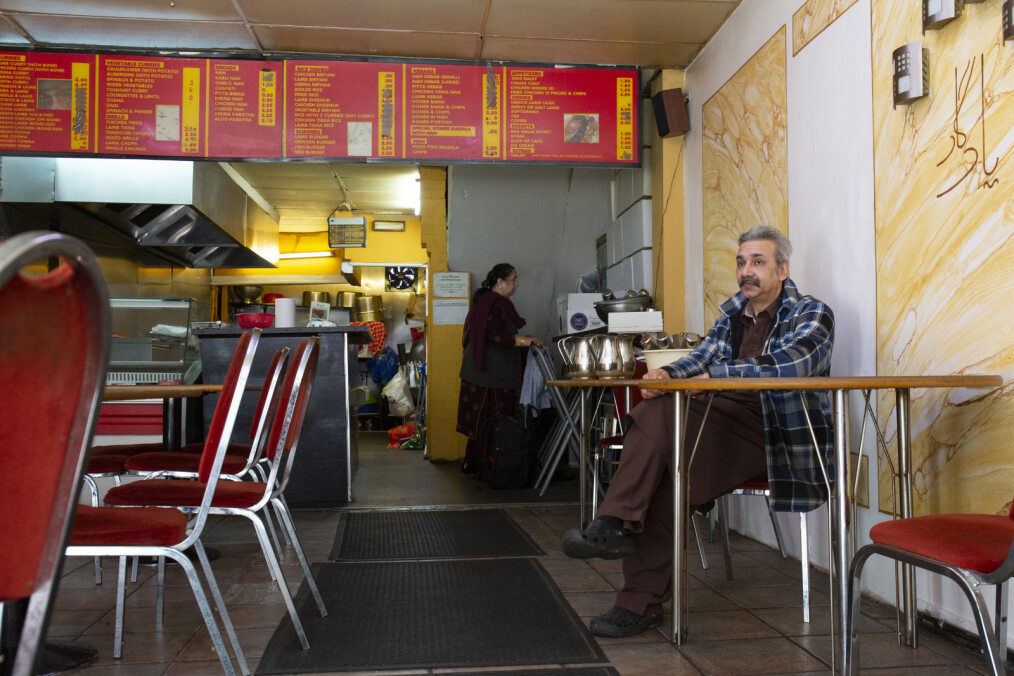
We bid Fred farewell and return to the street. The sun is setting, and clouds now cover Manchester. Andy and I walk north up Cheetham Hill, on the outskirts of town, where he is due at an interview with MANCUNIAtv, an internet chat show run by a former Factory Records employee, Georgina Robinson.
The MANCUNIAtv studio is housed in an old textile warehouse built in the 1930s. As we approach the building, looming in the distance just behind it, like a watchtower, is the 234-foot Victorian redbrick ventilation tower of Strangeways Prison. An icon of Manchester, Strangeways has stood atop the hill on the outskirts of town since 1868, perhaps thwarting any impulse in the city thinking of getting a bit too radical. Steven Patrick Morrissey of the Smiths (who also claims to have been at the Sex Pistols concert in 1976) ironically named the band’s last album Strangeways, Here We Come (1987).
The studio is packed for tonight’s show, to be taped live and then put online the following week. MC Tunes, a rapper from the Factory days, has turntables set up in a corner and is spinning records, loudly. There are young people and poets and punks and squares like me and tattooed dads whose musical dreams died when the Haçienda shut down, but with their 16-year-old drummer boys by their sides moodily keeping it alive. One of the teenage quartets, Scapegrace, hops onstage for a sound check. Their sound is punk, or post-punk; perhaps it is post-post-punk. It is definitely in the Factory spirit but beating with the pulse of youth. The walls of the room are lined with concert flyers from Manchester’s heyday.
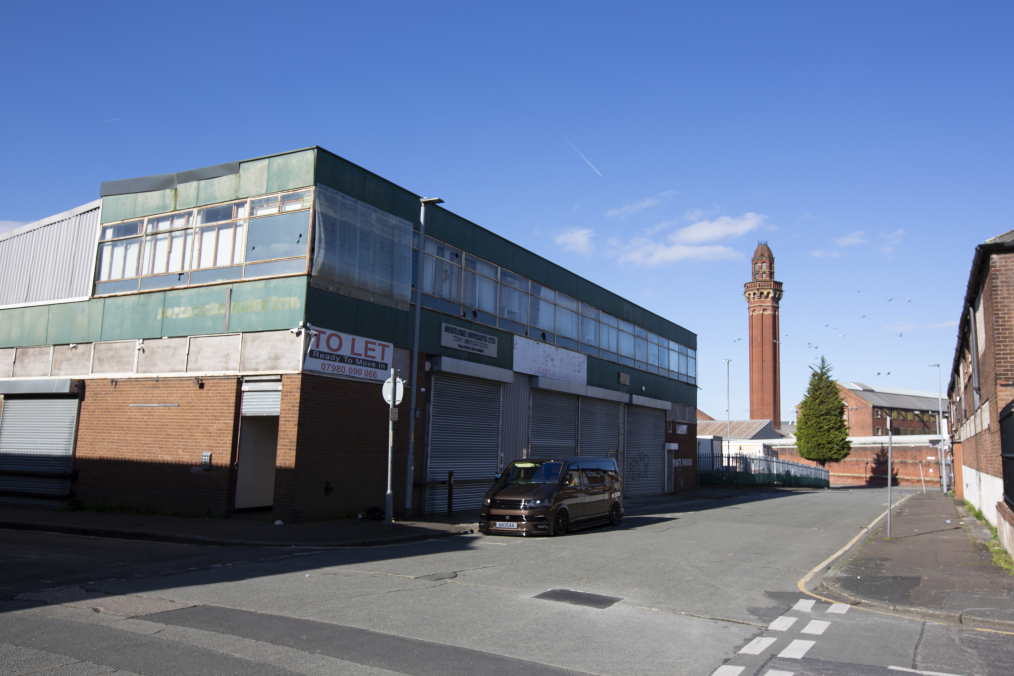
Were it not for Georgina’s efforts, this could all prove pastiche. But she is diligent in scouring the city for new talent and giving young bands like Scapegrace a place to play. She tells me that she is especially interested in platforming bands that cannot get gigs within the city center’s changing landscape. With Andy being a friend from the Factory days, she makes space for an old head like him on the bill.
I walk across the room, the strange roof sloping down like something out of Alice in Wonderland, to find Andy hunched over, speaking with a poet, Jack Horner (pen name Leon the Pig Farmer). Jack is an ex-army serviceman. He tells us how the government’s abandonment post-service led to him seeking post-traumatic stress relief through poetry.
Eventually, Andy sits for his interview. The crowd, this composed mixture of old and new, listens attentively. Andy is interviewed for about 10 minutes and draws laughs and claps and nods, and after he’s done, he holds court for a bit before it is time to go. We make a sneaky exit, but not before a woman recognizes Andy from the Haçienda dance floor. “I thought you looked familiar,” he says.
On the street, it’s—pardon my Mancunian—“chucking it down.” Andy attaches a waterproof hat to his head, protecting his luxuriant silver hair from the rain, and we walk back down Cheetham Hill into the city center. I become lost in thought as I contemplate the new culture being nurtured beneath the Strangeways tower, wondering what other art is being kept out of the city center and on the fringes. I struggle to keep up the pace, half due to my musing but more because of Andy’s long strides in the rain.
As we split up, Andy heads toward a pub to meet a friend and drop off a book. A bus blares past us, its wheels whooshing up a torrent of water onto Andy’s bottom half. He looks down at his sopping jeans and boots. I apologize and ask him if he’s okay.
“Welcome to Manchester!” he says, beaming, not at all spun by the soak.
I watch him walk away. For Andy, it is what it is, and he’s not here to tell anyone what to think about it.
¤
Chandler Dandridge is a licensed psychotherapist and adjunct faculty member at Pepperdine University in the Graduate School of Education and Psychology. He is also a contributing writer at Jacobin.
LARB Contributor
LARB Staff Recommendations
“London Has Burst into Bloom”: On John Davis’s “Waterloo Sunrise: London from the Sixties to Thatcher”
An oddly conceived but solidly researched study of 1960s and ’70s London.
The Alien and the Intimate: The Writing of Ian Curtis, Joy Division’s Poet-Frontman
The Writing of Ian Curtis, Joy Division’s Poet-Frontman.
Did you know LARB is a reader-supported nonprofit?
LARB publishes daily without a paywall as part of our mission to make rigorous, incisive, and engaging writing on every aspect of literature, culture, and the arts freely accessible to the public. Help us continue this work with your tax-deductible donation today!